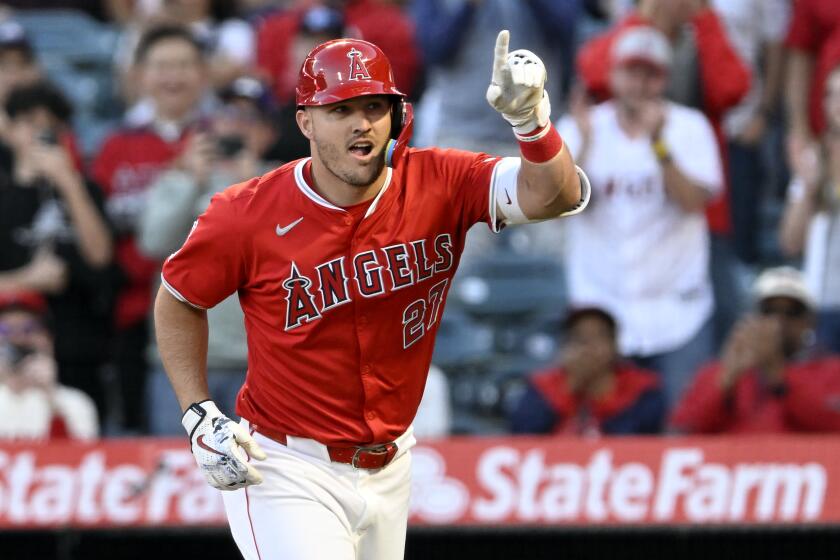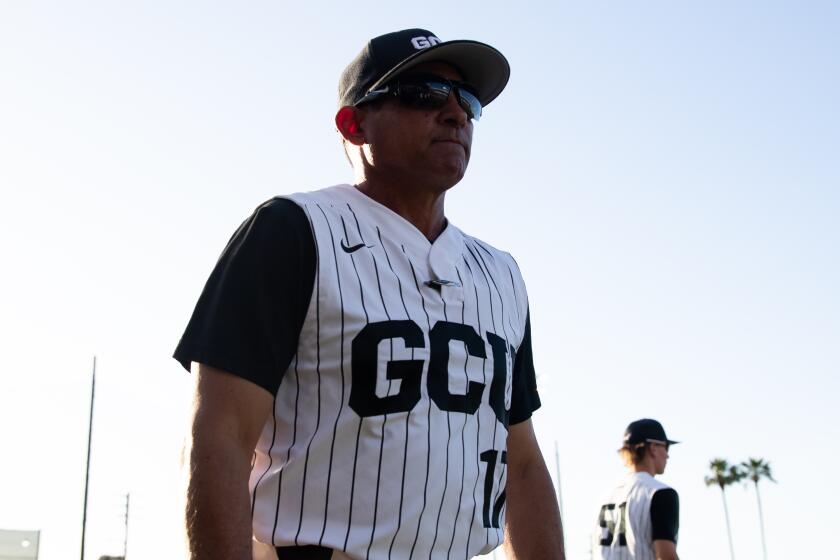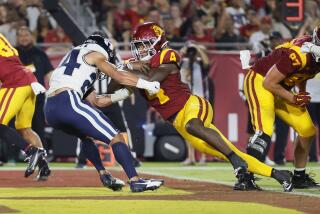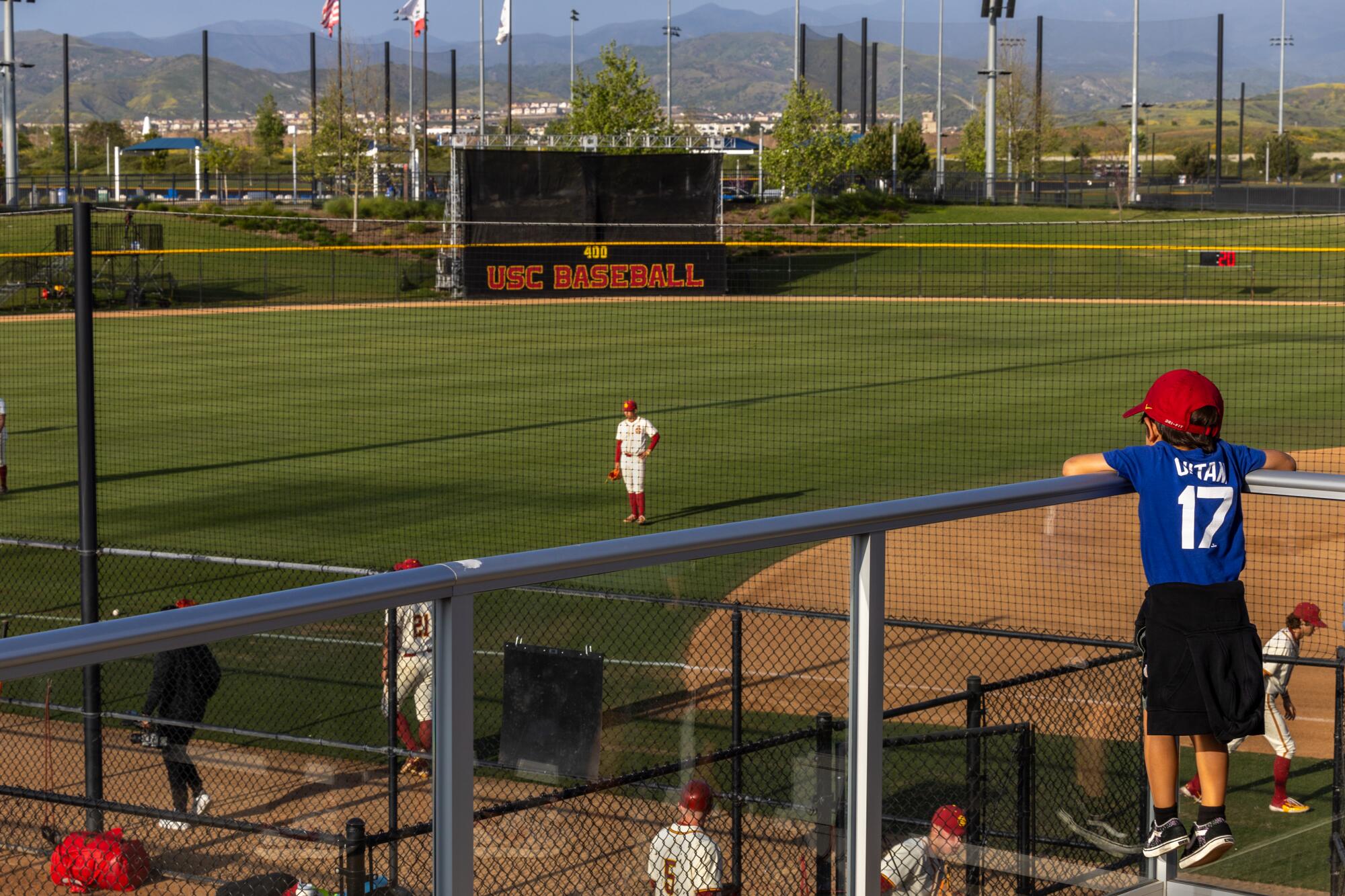
- Share via
“You ever played Mafia before?”
I had asked Connor Clift, a senior catcher for the USC baseball team, about the Trojans’ trying season.
“We play Mafia for hours,” Clift said.
It’s a video game.
“You have a sheriff, and you have townies, and the mafia tries to kill the townies, and the sheriff tries to catch the mafia,” he said. “Nobody knows who is who, and then you fight it out.”
The Trojans play for hours, because they ride the bus for hours. They are a team without a home.
Any chance the Angels had of postseason contention this season depended on a healthy Mike Trout and a healthy Anthony Rendon,
They practice half an hour from campus — an hour, with traffic. They play most of their home games an hour from campus — two hours, with traffic.
“Beat the traffic,” sophomore outfielder Austin Overn said, “or else you’re screwed.”
The most distinguished team in college baseball history is homeless. The 12-time NCAA champion Trojans cannot play on campus because of construction that includes upgrades to Dedeaux Field and new facilities for the USC football team.
When USC hired Andy Stankiewicz as its new baseball coach two years ago, he said had been assured whatever construction would take place would displace the team for the 2028 season.
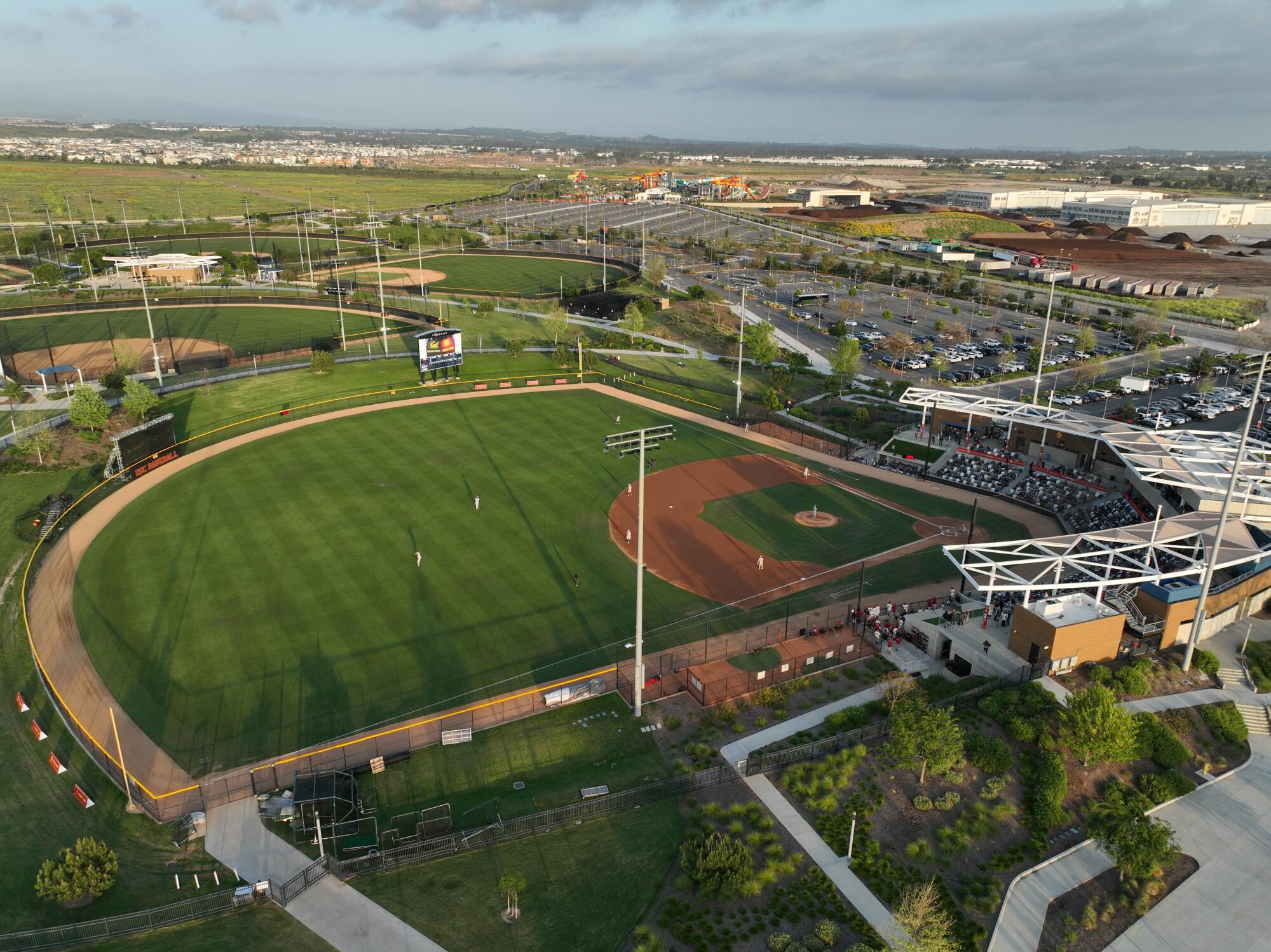
“That’s it. One year,” he told The Times then. “When it’s over, we’re going to be in a gorgeous, brand new Dedeaux.”
That timeline changed last summer. The baseball team had to vacate last fall — and for two years, not one.
“That was a little bit of a surprise, honestly,” Stankiewicz said. “You have to learn to make the adjustment on the fly and keep going.”
Coaches and administrators scrambled. Baseball teams long have been barnstormers, but the Savannah Bananas do not have to worry about classes.
For fall practices, the Trojans bused to El Camino College in Torrance. The community college had priority for the baseball field in the afternoon, so the USC players shifted their classes to the afternoon and departed for El Camino as early as 7 a.m.
On occasion, Stankiewicz said, the Trojans would get there and the gates to the field would be locked, and the team would have to wait for campus security officers to come by and open up.
To leave El Camino at 11 a.m. and get to class at USC at noon, Overn said, could mean rushing to get in a shower and a couple bites of lunch in between.
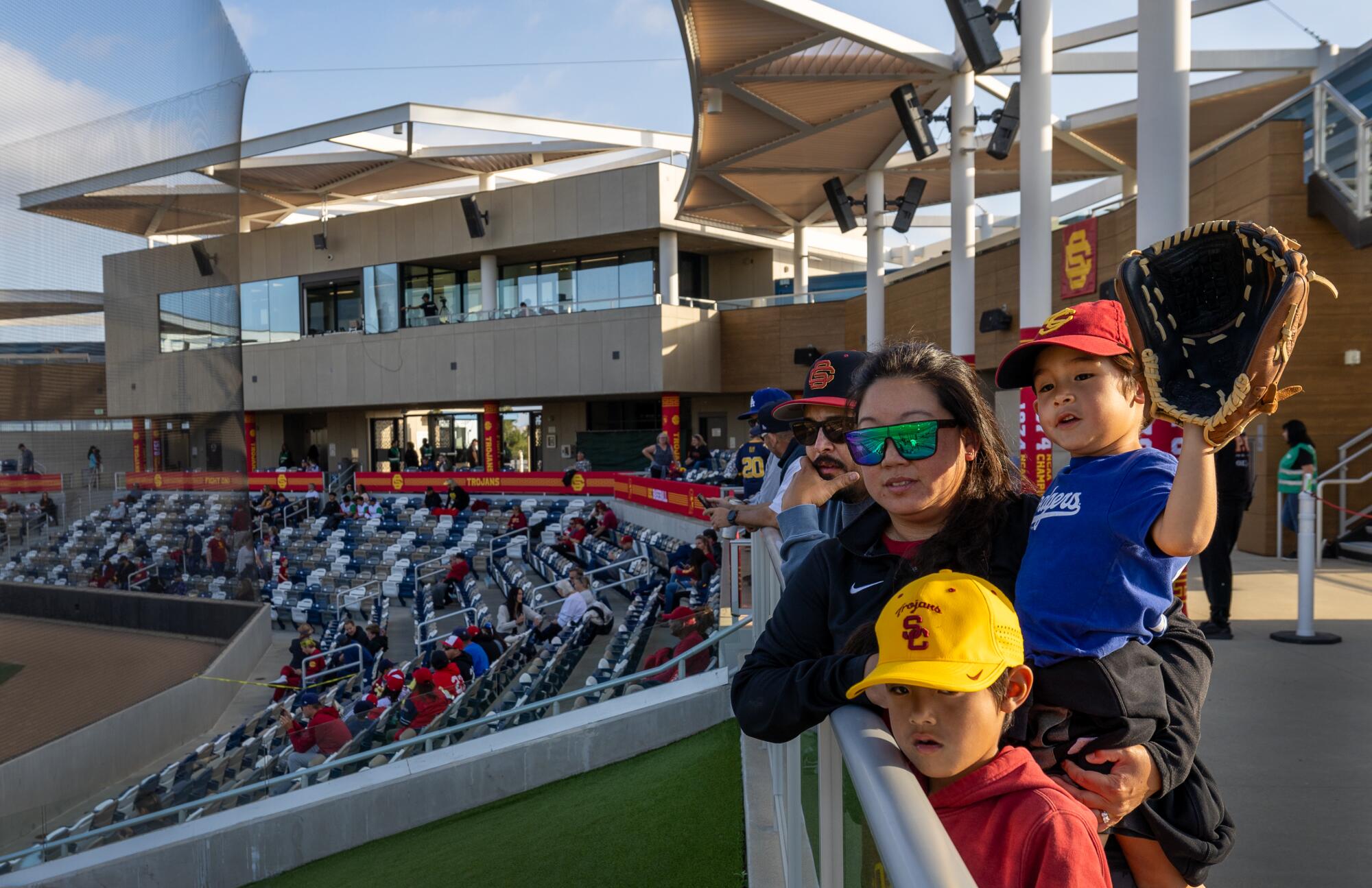
“It was,” he said with a smile, “a little fast for me.”
The Trojans already had their 2024 schedule. No school would displace its own team so USC could play there. And, as USC associate director of operations and event management Garrett D’Angelo said, “We wanted one spot that was home.”
In Irvine, on the site of the former El Toro Marine base, voters rejected a proposed international airport two decades ago. Since then, a community sports mecca dubbed the Great Park has blossomed there, surrounded by thousands of homes. The NHL’s Ducks built themselves a practice rink there, not far from a stadium used by a minor league soccer team.
That is where USC found its home away from home, at a sparkling 1,300-seat ballpark designed to host championship games of youth tournaments. The ballpark is surrounded not by campus landmarks, but by an iconic orange balloon on one side and a water park on another side.
No one expected students would show up, but USC has a robust alumni base in Orange County.
“This was the best option on short notice,” said Rock Hudgens, USC director of baseball operations.
The Trojans built their own locker room, because the one in Irvine had 12 lockers and USC needed 40. They rented an ice machine and arranged for regular deliveries of ice.
The ballpark did not include a batter’s eye. The Trojans contracted with an event production company to deliver one, and so the makeshift batter’s eye is framed in the same way a concert stage would be.
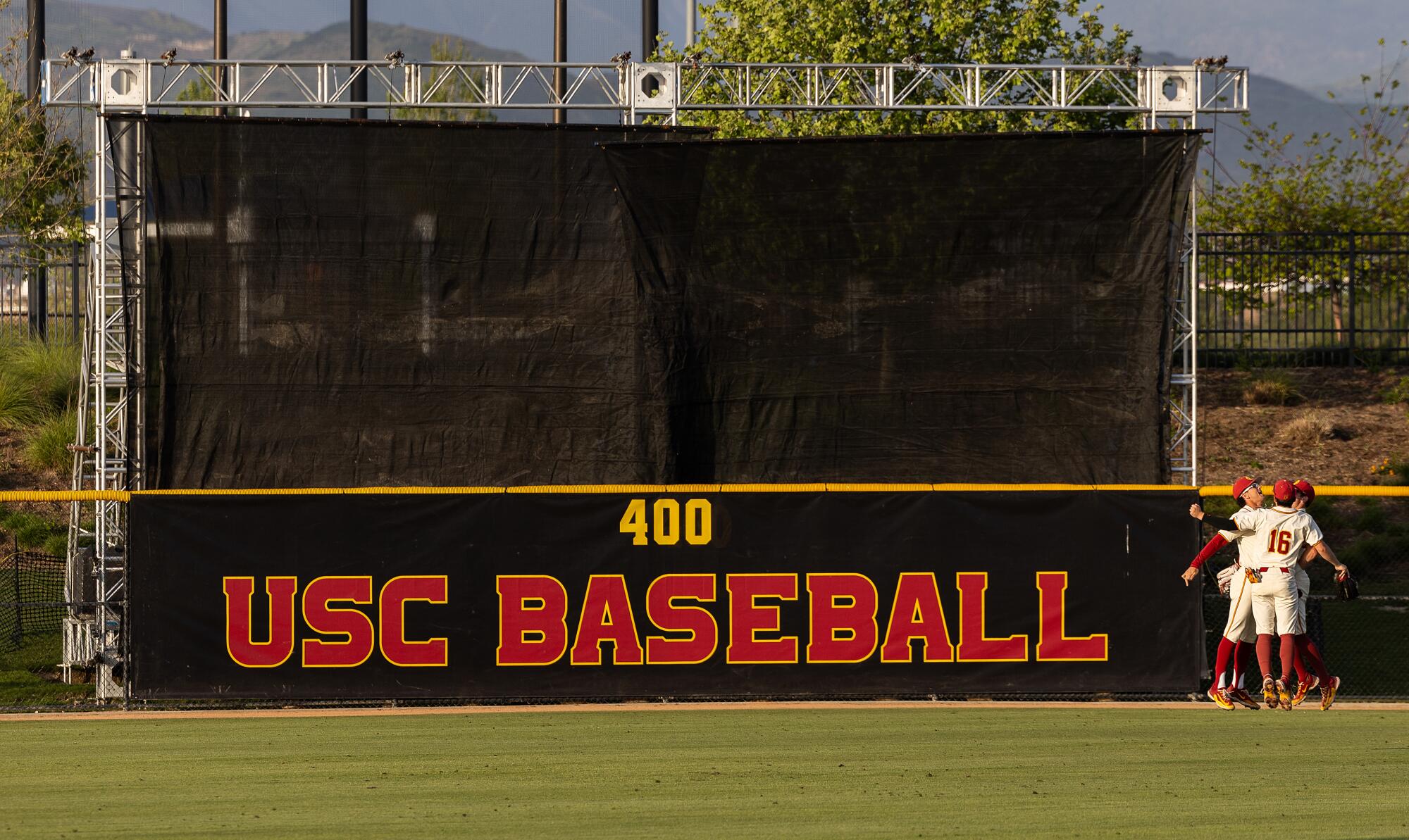
To make the place feel like home, they wrapped ballpark columns and draped railings with USC decor. They used Velcro, because the wraps and drapes come off when the stadium is used by others — including the weekends USC had to rent fields at Loyola Marymount and UC Irvine because the ballpark already had been reserved.
At the start of May, when USC had its finals week, players normally would have walked to class Thursday and Friday and taken their exams. Instead, because USC had a home game Friday night in Irvine, the players bused to Orange County Thursday afternoon and took finals in a hotel Friday morning.
The Trojans have fallen on hard times since the glory days of Tom Seaver and Fred Lynn, Mark McGwire and Randy Johnson, Barry Zito and Mark Prior. They have not won an NCAA championship in 26 years.
Over the past 18 seasons, they have posted three winning records and made one postseason appearance.
The Southland is not exactly a hotbed for college baseball — Cal State Fullerton and Long Beach State aside — but the Trojans have not averaged even 1,000 fans for years. In 2015, the last time USC posted a winning record, the average attendance was 826.
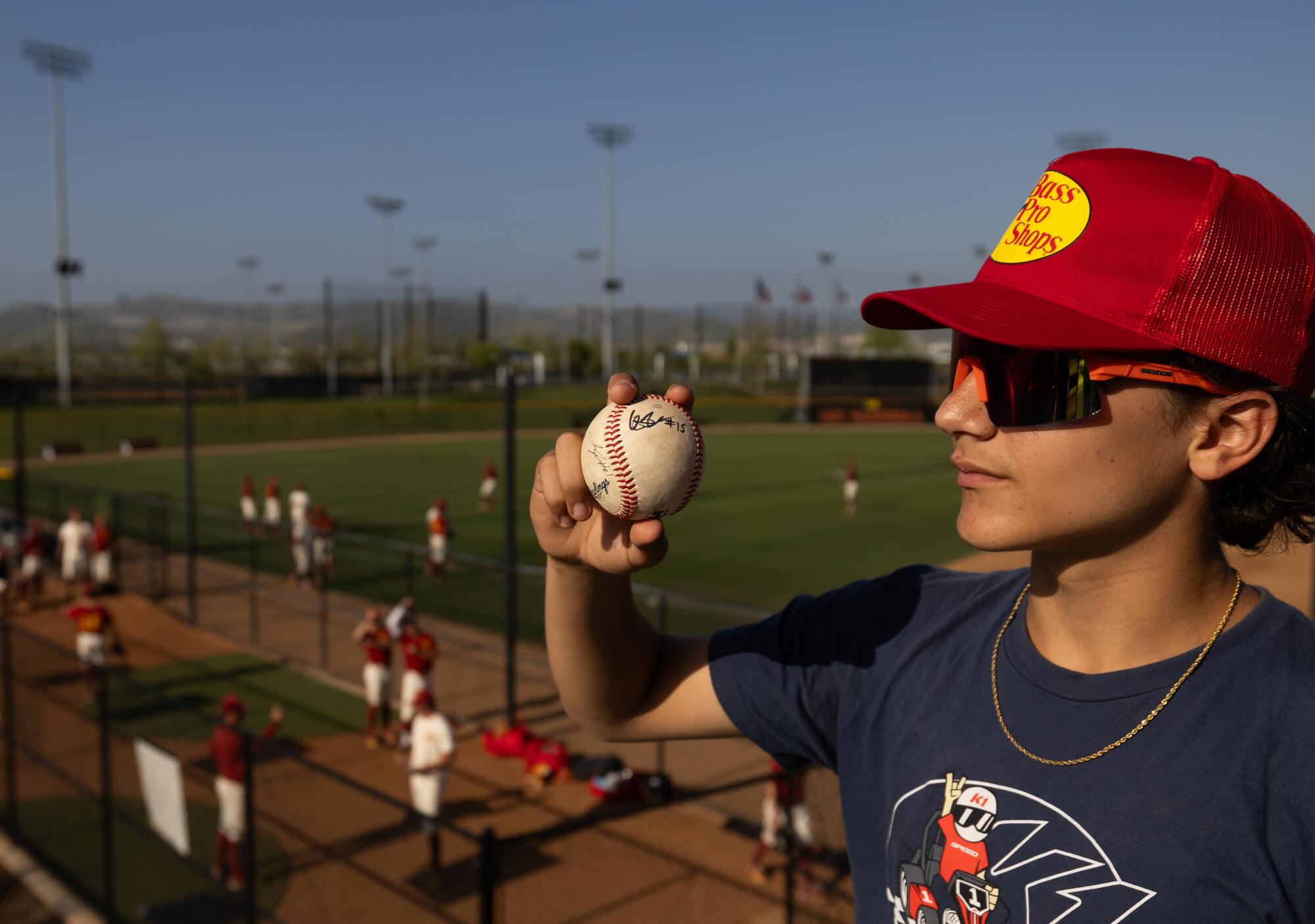
That is what makes this home-away-from-home season such a pleasant surprise. The students may not be here, but admission is free, and youngsters playing on adjacent diamonds stop by with their families.
Josh Boatright, 14, rode his bike past the ballpark one day and checked out a few innings. He has been back three times, although he admits he would not be as interested in the Trojans if the team played at Dedeaux Field instead of in his neighborhood.
“If I go all the way to L.A.,” he said, “I’d probably go for a Dodger game.”
New USC baseball coach Andy Stankiewicz overcame long odds as a player and coach. He believes returning the Trojans to greatness is more than a dream.
The Trojans have averaged 740 fans at the Irvine ballpark this season, more than they averaged at Dedeaux Field last season, even for a team with a losing record. USC has three games left in Irvine this season.
“I feel like, as of now, it’s a home,” Overn said. “For the most part, I feel like we’re here all the time.
“It’s a home. It’s obviously not the home we were expecting this year.”
And, after we talked, Overn walked into the Friday night — not to a dorm room or an apartment or a fraternity, and not to a campus party, but to a bus that would take him to a Marriott hotel within walking distance of an outdoor mall that celebrates “life at its most stylish, delicious and exciting.”
More to Read
Go beyond the scoreboard
Get the latest on L.A.'s teams in the daily Sports Report newsletter.
You may occasionally receive promotional content from the Los Angeles Times.

